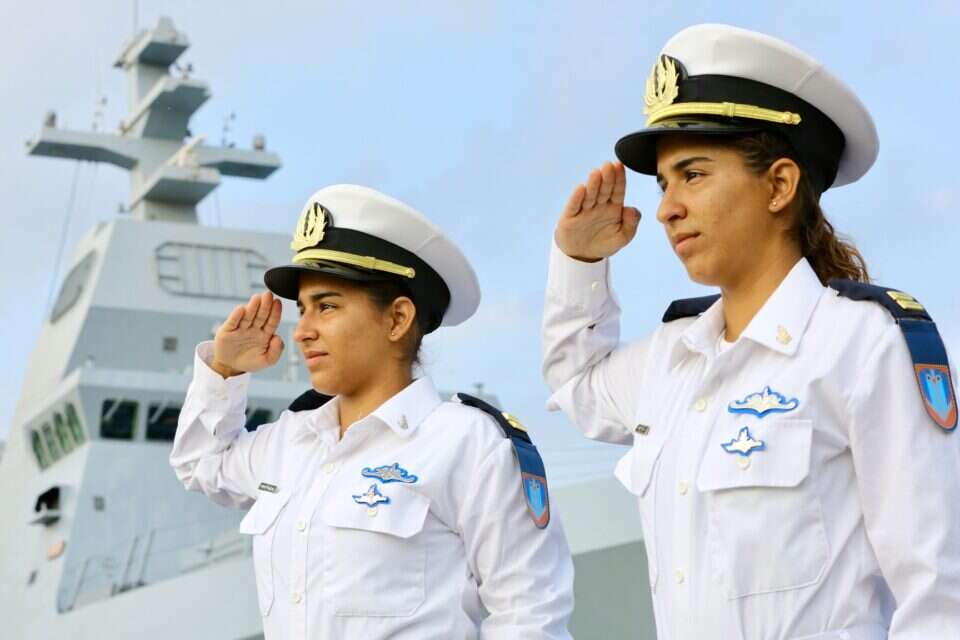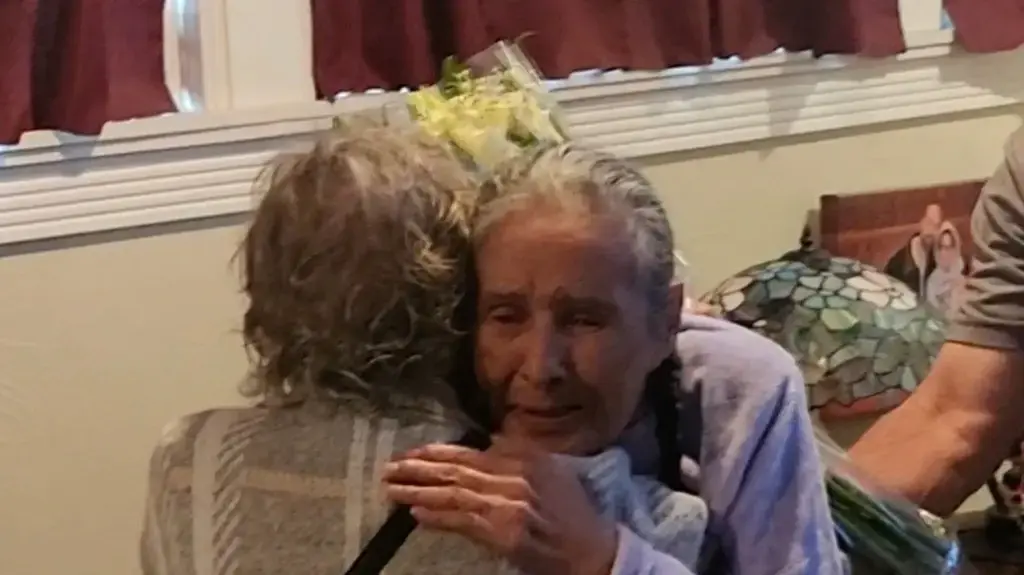They are very similar in appearance, and despite the slight differences between them, they sometimes seem like a deceptive visual duplication.
All their lives, for 21 years, they have been walking hand in hand, accompanying each other, shoulder to shoulder.
It was clear to both of them that even for the historic moment recorded this week at the Navy base in Haifa, they will stand together - as usual - together.
The sisters Lt. Lee Tene and Lt. Shai Tena of Rishpon are the first twins in Navy history to complete a seamanship course.
In the exciting ceremony on Sunday, which marked two grueling years and four months, they marched alongside another 36 graduates of Course No. 143, and the pride was clearly evident on their faces.
After all, they were two of the three women who completed the prestigious course (also in the previous course, which ended six months ago, three women completed).
In ten days, each of them is about to be appointed commander of the corps' missile ship, commanding a crew of about 12 fighters.
Lee has served on fighters engaged in discovery, navigation and communication, and Shai on fighters from the electronics department.
"We did not plan to go to a seamanship course together, but it turned out that way," Lee exclaims.
"I am the happiest person in the world to have taken this difficult course with my twin sister. There is no doubt that the presence of both of us, and the support we have given each other, has helped us."
The culmination of the ceremony, for their part, was when Shai was declared outstanding in the electronics course, and was awarded the rank of lieutenant colonel, Major General Aviv Kochavi, and Navy Commander, Major General David Selma.
Shai: "When the chief of staff stood in front of me, my heart pounded and my hands shook.
He asked me why I came to the captains, and I answered him 'because of the job'.
As he passed me he looked at both of us and said with a smile: 'You have decided to confuse me'.
Then he added 'Congratulations'.
It's a moment I will never forget for the rest of my life. "
In the excited crowd stood members of the extended Tena family cheering with double cheers.
"At first we joked that they would wear a shirt with the caption 'Two-thirds of the girls are ours,' but in the end they gave up," Shai smiles.
"In our family less connect to such gestures."
A few days before the ceremony, we meet at a cafe by the sea in Tel Aviv.
Although their body structure and height are identical, Shai's face is rounder compared to Lee's slightly elongated face.
Their complexion is brown ("Write that on Mother's side we are full Yemenites"), and their eyes smile in common light.
"It very much depends on how we dress and gather the hair, but by and large - to this day we are confused," Shai remarks immediately.
Did you ever take advantage of the similarities between you?
Shai: "We are good girls, but there was a case towards the end of high school, when we went into activity as part of an Israeli travel project in Israel. Lee and I were assigned to separate groups, and decided we must work on everyone at least once. For several hours we exchanged groups "Very sharp will notice that our voices are a bit different. Except for one student, no one picked up the replacement."
And in the army?
Shai: "One day I went to Lee's ship, to fetch her a bag, and the soldier in the doorway let me in, because he thought I was her. There was also a time when I was on guard duty, and Lee's commander saw her walking at the base. And I left my guard post. "
Throughout the interview, they complement sentences between them, never ceasing to shower with mutual compliments and compliments, which testify to the sincere and warm love of sisters.
"This can be attributed to our parents, who from an early age were educated to be there for each other," Lee explains.
They also taught you to pursue dreams and not be afraid to dare?
Lee: "Right. They let us experiment with anything we wanted, and we were never told we could not. That was also the case when we decided to take a pilot course and later a seamanship course."
• • •
They were born on May 28, 2000, at Schneider Hospital in Petah Tikva.
Lee was one hour ahead of Shai in going out into the world.
An artist, Yodfat (50), a lawyer, and their father, Zeev (56), a former civil servant.
Yodfat became pregnant naturally, which a routine ultrasound examination revealed would end in the birth of identical twins.
The birth itself took place in the 34th week of pregnancy, by caesarean section.
Yodfat: "They were born weighing two kilograms, an excellent weight for twins in the middle of the seventh month of pregnancy. But Lee, the first, suffered from respiratory distress.
Zeev: "Shai, unlike Lee, was sent to the nursery, so that week we ran between the premature baby and the nursery."
At the end of a week, when the babies gained weight and got stronger, the happy family returned home.
Zeev: "Beyond the fact that they were completely identical, and I was also confused between them sometimes, they were both comfortable and considerate babies. They usually did not get sick together. When I was crying, Shai was calm, and when Shai was sick, I was healthy."
Yodfat: "We had good luck, a good experience. They were smart and creative babies, stubborn like a wolf, even though I am stubborn too, and both are very musical. To this day, Lee plays the guitar, and Shai the piano."
Zeev: "They got the motor ability from me, but upgraded. At the age of four they were already cycling, and they both really like sports and martial arts. Just before enlistment they decided to get a motorcycle license and go on a diving course, but they will complete both in the future."
In their childhood.
"Only once did we tease others because of the similarities between us," Photo: From the family album
At the age of one, the family moved to Moshav Yanuv in Sharon, and when they turned five, their sister Adi (16), now a 11th grade student, was born.
Shai and I studied in the same kindergarten and in the same class, and from the moment they entered first grade (at the "Bachar Russo" school in Tzur Moshe) until the end of middle school and high school (at the "Dror" experimental education campus in Moshav Bnei Dror) - they were never separated.
"There was no agenda here, it just rolled like that," Yodfat explains.
"They got along very well with each other. There was no unhealthy competition or jealousy between them that hurt them, so it was completely natural."
Lee: "In high school they tried to separate us at some point, but since we studied physics and music together, and also in English - we ended up staying in the same class."
Did you not sometimes feel that this togetherness then prevents them from developing separately?
Shai: "Absolutely not. The competition between us comes from a healthy place of the bride and groom, and it pushes each of us to be better. As a child I always wanted to be with me, every separation between us felt artificial and unnatural."
Do you also partner with the same companies?
Shai: "We also have separate companies, but by and large we are the same group."
You will never be many?
Lee: "Really we are almost not many. We have been sharing the same wardrobe since we were babies, so sometimes we can quarrel over a shirt, but it's really negligible. .
Didn't it happen that they fought, say, over the same guy?
Shai: "There was one kid in the brigade that I really wanted, but he started with me. Lee didn't want him, and he did not know I was interested, so it passed without drama. But even if in the future we get into this situation, we will both give up the guy to keep friendships between us ".
How are you different?
Shai: "I have a lot more pepper than me. When she enters the room, she is immediately noticed - and she becomes the center. She also connects with people more easily. I am a little more shy. I check the area from the outside, and only when I feel safe do I approach and show who I am. Lee also has a slightly shorter thread than mine. "
Lee: "When I see that people are not respected, it drives me crazy, and then I can react without thinking. Today I learned more to control it. When I was in primary school I had a good friend who suffered from stuttering and lameness in my leg. I shouted at them - and I stopped it immediately. "
Shay: "Beyond that, I think, I'm smarter than I am. She works hard to get what she wants, and I have less patience. When we were studying for high school exams, and even in a seamanship course, she was studying in depth and thoroughly, and I had to take breaks all the time." .
Lee: "To Shai everything comes more easily. She is very intelligent and sensitive, she has a great giving ability and a huge heart."
Shai: "Well, let's conclude that we are different in character, but we have the same hobbies."
And these hobbies are many and varied.
Alongside sports activities and martial arts training using the "Dennis Survival" method, which they became acquainted with in high school, as well as swimming, both, as mentioned, are musical and creative, and both sculpt artistic sculptures with clay.
They also both love to read books in Hebrew and English, thanks to Abba Zeev, who immigrated to Israel from Canada.
"At first English was a secret language between him and his mother, which we will not understand, but later it became the language spoken at home, between all of us," Shai explains.
According to them, ballet and dance studies never interested them, and Lee even claims that she was "a kind of Tom Boy, I preferred to play football outside."
Shai: "Let's just say it was always easier to take us to those classes, because it made the shuttle operation easier."
• • •
The common interests also continued into their military service and the same professional path they both chose.
They came together for the first order tests at the recruitment bureau in Haifa, in 2016.
Lee: "I was sure that in the army all our placements and sorties would take place separately, but here too we were summoned to all together."
What is the explanation for this?
"Probably because we were born that day. When we enlisted, we found out our personal number was tracking. Lee's ends in the number 5 and mine in the 6th."
They were both given a 97 profile, and thanks to the high personal data they received ("DFR 90"), they began sorting for the Intelligence Corps and the pilot course. Lee soon gave up intelligence ("I realized it was not for me"), while Shai progressed through the screening stages, until the interview The personal made it clear that she was interested in combat service - and her interviewers did not pass it on.
Both passed the pilot course selections successfully.
Shai: "We were not closed on the fact that we wanted to go there, but once we passed the screenings we could no longer sign a waiver. Once we passed the formation for the course it was clear to us that we were continuing."
They enlisted in the IDF together on July 15, 2018, two days after their final matriculation exam, and began the pilot course at the Hatzerim base in the south. They both fell in the initial flight phase.
Lee: "Each pilot in a pilot's course has to go through 15 flights, during which he is examined for his suitability and the trend to which he will be placed later. Shai managed to fly ten times before being canceled, and I was fired a month later, on my 15th flight."
Was there a common disappointment?
Shai: "Obviously there is disappointment when you get 'no', but today I know that everything directed us to where we are today, and that's the sailors. The pilot course made me realize that flying is not really for me. I am less solo, and more a person of people and group dynamics, to act "Together in a group. That's why I really believe that everything happened for the better, so that we can reach the most accurate place for us."
The desire to do significant military service came, they said, from home.
"Father was a lone soldier who came from Canada to enlist. He was a fighter in the Golani Regiment, and always talked at home about how important it is to do meaningful service. Our son from a young age. "
Zeev: "The army has shaped my personality for the better, and I believe that everyone can create a meaningful experience that suits them. A role that requires a lot - also gives a lot. This is the message I conveyed to the girls."
Yodfat: "I was a third officer in the army. The girls chose a significant experience, and went for it with all their might."
After being fired from the pilot course, Shai and I were looking for another significant role, but asked for a service deferral to travel a bit and work.
Lee: "Recruitment for the pilot was done two days after our matriculation, so we asked for a time-out of a few months until the re-enlistment - and fortunately the army responded in the affirmative."
For Shay, the choice of seaman course was immediate.
Lee considered enlisting in a tank commanders' course and even a sting, but after a month of deliberation she decided to follow in her sister's footsteps, and also underwent a formation for sailors.
Shai: "When we were in the 11th grade, we participated in GDNA Captains' Week. It is in fact a week of exposure to this position in the Navy.
For the first time we both did not pass, but at the end of the twelfth we decided to try again - and we succeeded. "
Shai underwent the formation of the captains and was placed in the electronics department in the ship's defense system.
Lee went through the formation a month later, and was assigned to the sailing department, which is responsible for navigation, communications and weapons.
• • •
The recruitment day for both of them for the seamanship course is set for April 14, 2019. Lee: "We have already prepared ourselves mentally for the fact that we will separate and not enlist together for the same cycle, but fortunately this time we stayed together. It greatly reduced the stress we both felt on this significant day."
Shai: "We were very excited on the day of the recruitment, but it was excitement in a good section. We did not cry because we are not a crying family."
The seamen's course lasted two years and four months, and was started by 90 soldiers, including 12 girls.
After a 03-and-a-half-month rifle training at the naval training base in Haifa, everyone moved on to further training at the Zvia base in Eilat.
Lee: "It was a very difficult stage where we underwent intensive training. It is a physical and mental difficulty. You are a new soldier, and you are put straight to school at sea, on board, and on the ship. You are learning for the first time what a rubber boat is. A lot at this stage, and it's not a simple business. "
Shay: "They bring you to the limit of physical, individual and group abilities. One of the most important things in a missile ship service is to know how to get along in a group, and that's something that is tested a lot. Beyond that, departures were every 21 or 28 days."
Did you like the sea before enlisting as a captain?
Lee: "The sea has always been perceived by us as a place of entertainment with friends who come to sunbathe and enjoy a little. We have never experienced any closeness or special love for it."
What are the difficulties you remember most from the course?
Shai: "A seafarer tester is a physical tester who requires you to run with a vest and weapon for a distance of six kilometers, plus a 200-meter run in the water, plus a facilities track - which you have to cross. Anyone who does not pass gets three more chances. It's very difficult for me, because I'm good at sports.
"Lee went through the first blow. To get through the second time I would wake up early in the morning and go for a run. When I passed the exam, I realized how significant it is to learn from failures and rise from them."
In Monday uniform, at STIL. "We are preparing for the possibility that we will not have overlapping departures", Photo: Oren Cohen
Lee: "At the end of the advanced stage I reached an extreme gap between my personal life and the professional field. I then broke up with a friend, and the studies in the course were very intensive. Out of the difficulty I learned how to push myself more and more."
Together coping was easier?
Shai: "Because there were almost no girls in the course, we slept together, but because we were both not included in the same trend, during the day we were also much apart. By the way, at some point gender is no longer relevant. You make friends, who become part of your family on the ship, and that It doesn't matter if it is a man or a woman. "
When you went home on the weekends, did you still spend time together?
Shai: "Obviously. We go out to clubs with our friends from high school, go to the movies or just for a fun day in Tel Aviv. I really like to cook, and recently I learned to weave challah from six parts. I also know how to make my heart very tasty. I make especially equal sandwiches. In the time we have left, we are at home, with the family. "
Lee and Shai passed the basic phase of the course - Navigation and Command (R&D) - which lasted four months, after which they continued to the second phase, where the emphasis is on the specific trainings for which they were intended.
Shai: "At this point I understood why I want to be an officer in the STIL: because of the ship and the dynamics with the people in it.
"Anyone who has not experienced teamwork in the STIL space will never understand this. I was really waiting for the moment when you were on the ship."
Lee: "I actually experienced difficulty at the end of this stage, especially academic difficulty. I no longer knew if the course was right for me, because the load was very large. The one who helped me was my commander. He told me that when it was difficult, it was easiest to make wrong decisions. "In the experiences he went through when he was in charge of Deborah (light cruise ship; MI), and the intimacy that is created between the crew members - and that made me realize that I want to stay."
Lee and Shai also successfully completed the third phase, which lasted about six months, in which they underwent professional training at the training base in the Haifa Navy, along with command content.
"This is a stage where we actually do an officers' course, only it takes place at the base in Haifa and not at BAD 1," explains Shai.
Due to the Corona practices, the fourth phase of the academic studies, which lasted eight months, was passed at the base and not at the University of Haifa.
In an intensive combined track of the university and the military, they completed a bachelor's degree in political science, which led them safely to the last stage of the course - the designated stage.
Lee: "In fact, the designated phase consists of two phases: an initial phase in the training base, which gives us the final training for the job, and the field-designated phase, which gives us the final certification for the course."
• • •
Starting next week they will be forced, for the first time in their lives, to separate.
Lee will become Deputy Detective, Navigation and Liaison Officer (GNC) on the Saar 4.5 missile ship, and Shai will begin her role as Deputy Electronics Officer on the Saar 5 missile ship.
Lee: "I'm going to be the only daughter on the ship, which means I'll sleep in a room with three other officers. But I'm used to it from the course, so I'm not afraid.
Shai: "I'm currently going to be the only officer on my ship, but maybe more will come. Anyway, there are three fighters on the ship. Assault 5 is a little bigger than the ship where you will serve me, so you could say I won a little better living conditions. I will only live with Two more officers. "
What will the job require then?
Lee: "In the day-to-day routine they mainly take care of the ship and do maintenance work on the weapon systems, to maintain their competence. At sea my job will also be to navigate the ship."
Shai: "By and large, we also have the same routine activities, but in my job I have to take care of the integrity of the ship's defense system."
By the way, how do you overcome the nausea on the ship?
Lee: "We both did not suffer from a severe seasickness. In this respect it was relatively easy, but it is also something you get used to, and learn to function with nausea. Those who suffer a lot are helped by pills or dedicated patches against nausea."
Excited about the breakup?
Shai: "Overall, each of us has very good friends on the ship, and we are also preparing for the possibility that we will not have overlapping departures. This also happened to us in the seamanship course. There is always a way to communicate, even if we are in the middle of the sea, through the radio on the ships. "
Do you consider yourself a pioneer?
Lee: "We are not the first girls to complete a seamanship course, but I would definitely like to see more girls. I believe that integrating men and women in the army is important, and that any course opened for women is welcome, a step that will lead to an equal place. To a position that to this day is closed to her, not to be afraid, and to do so. "
שי: "בראש השנה דיברנו על זה במשפחה, ואמרתי שיש תקרת זכוכית שצריך לשבור. אני מרגישה שבכל שלב בקורס שעברתי - שברתי עוד תקרת זכוכית, ועוד אחת. שבירת תקרת זכוכית זה בהחלט משהו שהייתי שמה כיעד".
מה השלב הבא? פיקוד על סטי"ל? מפקדות חיל הים?
שי: "בואי נתחיל במפקדת סטי"ל. האופציה הזאת עברה לי בראש, אבל אני מאמינה שהחיים מגלגלים אותנו למקום שבו אנחנו צריכות להיות. כרגע אנחנו חתומות לשירות של חמש שנים. תוסיפי לזה את השנתיים וחצי של הקורס - וזה מגיע לשבע שנים וחצי. בינתיים הכל פתוח. אם אחת מאיתנו תזכה להגיע למעמד הזה, זה רק יוכיח שתקרות זכוכית נועדו כדי שננפץ אותן".
Michali100@gmail.com









/cloudfront-eu-central-1.images.arcpublishing.com/prisa/2C5HI6YHNFHDLJSBNWHOIAS2AE.jpeg)




